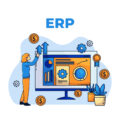In today’s fast-paced business environment, having an efficient and up-to-date ERP (Enterprise Resource Planning) system is crucial. However, many businesses are still using legacy ERP systems, which can be outdated and inefficient. This leads to the question: should you upgrade your existing system, or replace it entirely?
Understanding Legacy ERP Systems
Legacy ERP systems are older enterprise software that have been in use for a long time. While these systems were once state-of-the-art, they may not have kept pace with the rapid advancements in technology. As a result, they can become a bottleneck, hindering business growth and efficiency.
The Case for Upgrading Your ERP System
Upgrading your existing ERP system can be a viable option, especially if the system is still fundamentally sound and meets most of your business needs. Upgrades can bring your system up-to-date with the latest features and improvements, enhancing its performance and efficiency. Moreover, upgrading is often less disruptive than replacing the system entirely, as it allows you to retain your existing data and processes.
The Case for Replacing Your ERP System
On the other hand, there are situations where replacing your legacy ERP system might be the better option. If your current system is unable to meet your business needs, or if the cost of maintaining and upgrading the system is too high, then replacement could be the way to go. A new ERP system can offer improved functionality, better integration with other systems, and more efficient processes.
Evaluating Your Options
When deciding between upgrading or replacing your ERP system, it’s important to evaluate your options carefully. Consider factors such as the cost of the upgrade versus the cost of a new system, the capabilities of your current system versus those of a new one, and the potential disruption to your business operations.
Modern ERP Solutions
Modern ERP solutions offer a range of benefits over legacy systems. They are typically more flexible and scalable, able to adapt to changing business needs. They also offer better integration with other business systems, improving data flow and decision-making processes. Furthermore, modern ERP systems often come with improved user interfaces, making them easier to use and reducing the need for extensive training.
Conclusion
In conclusion, the decision to upgrade or replace your legacy ERP system depends on your specific business needs and circumstances. Whether you choose to upgrade your existing system or invest in a new one, the goal should be to enhance efficiency, improve data management, and support your business growth.
If you’re considering modernizing your ERP system, Verbat can help. With our expertise in ERP solutions, we can guide you through the process and ensure you make the best decision for your business.





